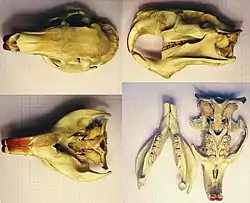| Hystricognathi Temporal range: | |
|---|---|
 | |
| Capromys pilorides | |
| Scientific classification | |
| Domain: | Eukaryota |
| Kingdom: | Animalia |
| Phylum: | Chordata |
| Class: | Mammalia |
| Order: | Rodentia |
| Suborder: | Hystricomorpha |
| Infraorder: | Hystricognathi Tullberg, 1899 |
| Families | |
|
Abrocomidae | |
| Synonyms | |
|
Eucaviomorpha | |
The Hystricognathi are an infraorder of rodents, distinguished from other rodents by the bone structure of their skulls. The masseter medialis (a jaw muscle) passes partially through a hole below each eye socket (called the infraorbital foramen) and connects to the bone on the opposite side. This, together with their lack of an infraorbital plate and the relative size of the infraorbital foramen, distinguishes hystricognaths from other rodent groups.
The 18 families within the Hystricognathi are divided into two parvorders, the Phiomorpha and the Caviomorpha. The Caviomorpha are mostly native to South America, with a few species in the Caribbean and North America, while the Phiomorpha occur in the Old World.

Behavior
Play behavior has been observed in seven hystricognath families. The caviomorphs chase each other, play-wrestle, and gallop. The longer-legged species chase more often than the shorter-legged species. They also rotate their heads and body muscles as a form of play.[1]
Phiomorphan hystricognath families
- Bathyergidae (African mole rats)
- Heterocephalidae (naked mole rats, monotypic taxon)
- Hystricidae (Old World porcupines)
- Petromuridae (dassie rat, monotypic taxon)
- Thryonomyidae (cane rats)
Caviomorphan hystricognath families
- Abrocomidae (chinchilla rats)
- Capromyidae (hutias)
- Caviidae (guinea pigs, wild cavies, and capybaras)
- Chinchillidae (chinchillas and viscachas)
- Ctenomyidae (tuco-tucos)
- Cuniculidae (pacas)
- Dasyproctidae (agoutis and acouchis)
- Dinomyidae (pacaranas and their fossil relatives, including some of megafaunal size)
- Echimyidae (spiny rats)
- Erethizontidae (New World porcupines)
- Myocastoridae (coypu)
- Octodontidae (13 species including the degus)
See also
References
Citations
- ↑ Fagen, Robert. Animal Play Behavior. Oxford University Press, 1981.
Sources
- Alfred L. Gardner Curator of North American mammals and Chief of Mammal Section, National Biological Service,Smithsonian Institution, National Museum of Natural History, Washington, DC, USA
- Charles A. Woods Florida Museum of Natural History, University of Florida, Gainesville, FL 32611-2035
- McKenna, Malcolm C. and Susan K. Bell 1997 Classification of mammals above the species level 631 Columbia University Press New York, New York, USA ISBN 0-231-11012-X
- Wilson, Don E., and DeeAnn M. Reeder, eds. 1993 Mammal Species of the World: A Taxonomic and Geographic Reference, 2nd ed., 3rd printing xviii + 1207 Smithsonian Institution Press Washington, DC, USA ISBN 1-56098-217-9 Corrections were made to text at 3rd printing